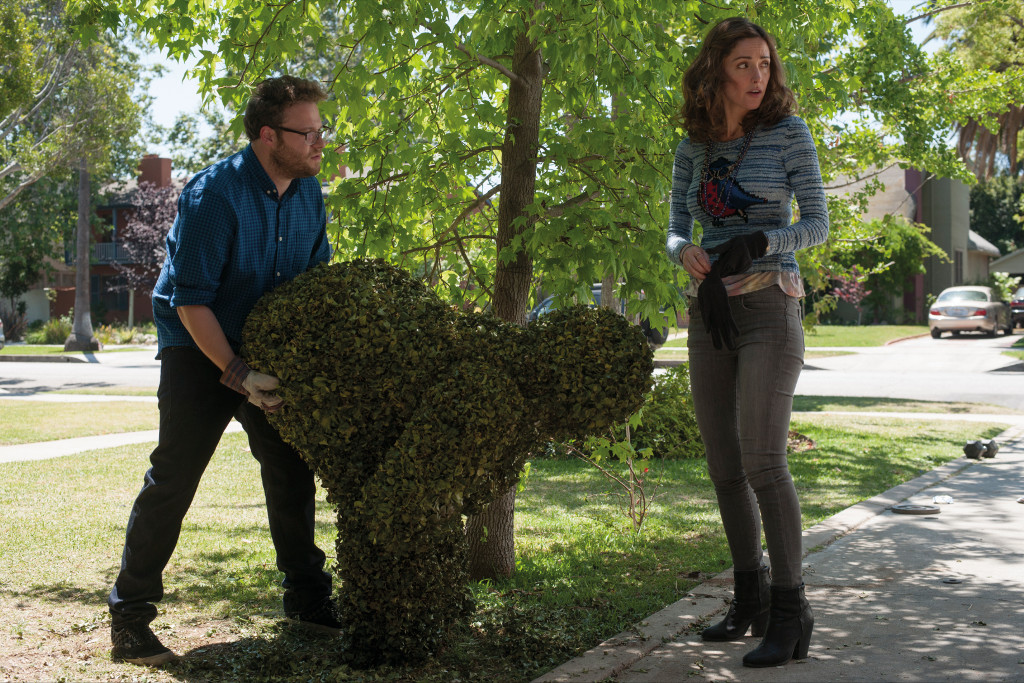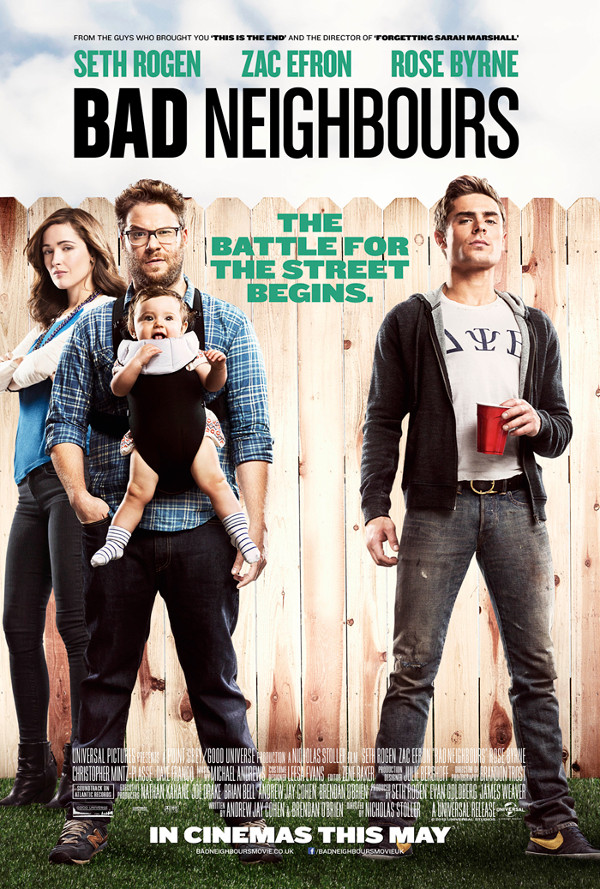Our Rose Byrne Is The Best Thing About ‘Bad Neighbours’, Seth Rogen’s Tame New Comedy
Is Rose Byrne our most underrated Hollywood export? Yes, she probably is.

When a college fraternity moves in next door to new parents Mac and Kelly Radner (Seth Rogen and Rose Byrne), it looks like something of a mixed blessing. Just easing out of their hard-partying days, the Radners are at first drawn to the bros’ ragers, spending a drug-fuelled evening out of home without ever leaving the range of their baby monitor. But the incessant noise next door soon wears down their patience, and when their relationship with the frat’s leader Teddy Sanders (Zac Efron) sours, they enter into a no-holds-barred war for suburban peace.
Like most films from the Apatow-Rogen constellation of comedy filmmakers, Bad Neighbours is amiable enough, if a bit slack. Director Nicholas Stoller (previously of Forgetting Sarah Marshall and Get Him To The Greek) is too quick to trade coherent plotting for a gag, but the film glides along for a while on the buzz of its raunchy spirit. There’s even a refreshingly frank aspect to the Radners’ love life — Rogen and Byrne have a goofy sexual chemistry that the film doesn’t shy away from (although it does seem to overestimate the hilarity of Rogen’s shirtless torso).
–
How to overcomplicate a comedy
The conceptual basis for the film is, at first glance, rock solid. Even the poster spells out the central conflict perfectly: jock vs schlub; Efron vs Rogen. But the film turns out to be unwilling to capitalise on this primal antagonism.
On the first night that the Radners party with the frat, Rogen and Efron develop a tentative sort of bro-ship, and make a pact that Mac will always ring Teddy before calling the cops on any of his parties. So when Mac caves in a day or so later and summons the police, it’s framed as a sort of emotional betrayal for Teddy (who is a dim-bulb sweetheart at his core), and it’s his hurt feelings that drives the escalating tension between the houses.
This emotional thread is ludicrously slender, but it’s typical of the film’s script. It’s as though the writers, in seeking to make sense of the frat vs family war at the heart of their narrative, decided to convolute the issue. By developing an expanding suite of hazy personal grievances that tie the central characters together, the film leeches the sport out of its own core concept.
–
Why comedies need to play their subtext
A lot of this could be due to the casting. Seth Rogen’s movie star identity is fuzzy, chubby, and self-effacing, and Mac Radner, give or take a certain degree of maturity, is the same old affable stoner you might find in most other Rogen vehicles. He doesn’t have enough intrinsic aggression to sustain a conflict with the frat, so it feels like the film has to spin out dramatic reasons to keep the characters at loggerheads.
Rogen’s best performance to date is still as the psychopathically deluded mall cop Ronnie Barnhardt in Jody Hill’s underrated Observe And Report (2009), in which he exposed a sort of bullish violence beneath his chubby exterior. Bad Neighbours could use a little more of that edge.
The same movie with a different lead — like Danny McBride — might’ve played the Radner-Frat antagonism as a sport of macho egoism, but Bad Neighbours doesn’t seem to have the wherewithal to do so. It’s packed with jokes that speak to male insecurity — it makes a repeated point of displaying Rogen’s pasty, flabby torso opposite Efron’s tanned, cut abs — but Rogen’s personality is too modest to give them any psychological heft.
So the film relies on making the conflict personal rather than primal, but the result is that it jumps over all the little bits of subtext that make the premise so juicy, and it flounders along without a coherent sense of stakes. The threat to Mac, or the Radner’s marriage, or their home, just never feels weighty enough to give the jokes any kick.
–
The rise of Rose Byrne
A scan through Rose Byrne’s filmography shows that she has quietly and gradually carved out a remarkable career for a young Australian actor. After a stint in local television, in Channel 10’s Echo Point (remember that ill-fated rival to Home And Away?) and a brief appearance in Heartbreak High, she was in a string of prominent local films, like the 1999 Heath Ledger classic Two Hands, or 2000’s The Goddess Of 1967 (for which she won a Best Actress award from the Venice Film Festival).
In 2004, when she turned up as Brad Pitt’s squeeze in Troy, it sort of looked like she might be consigned to Hollywood’s procession of disposable ingénues, and that her career would go the way of so many other Australian soap escapees.
But she soon took a five-year job on the TV series Damages, and built up a respectable body of supporting parts, working for acclaimed directors like Sofia Coppola and Danny Boyle. Now she’s in a sort of incredible position for any thirty-something actor. She’s had starring roles in Australian, American, and British productions, and has made her mark in indie drama (2012’s The Place Beyond The Pines), horror franchise (Aussie James Wan’s Insidious movies), and superhero blockbuster (2011’s X-Men: First Class). She’s also a recurrent collaborator to Hollywood’s reigning comedy mafia, having previously worked with Nicholas Stoller in Get Him To The Greek (2010), and in 2015 she’ll reunite with Bridesmaids’ Melissa McCarthy and director Paul Feig in Spy.
She also did her time in the Aussie music video scene. Let this Alex Lloyd clip refresh your memory:
Byrne quietly seems to have become one of the most commercially diverse and reliable Australian actors around, so it’s not all that surprising when she turns out to be the MVP of Bad Neighbours. Even during one laboriously awful extended joke about breastfeeding — that I will not describe except to say that it is Nip/Tuck calibre — she is the best thing about the film.
By some miracle of American internationalism, she’s been allowed to work with her native Australian accent, and this helps give her character a daffy intensity that complements Rogen’s mildness. Her Kelly is the real driver behind the Radner’s campaign to oust the frat, and Byrne is expert at infusing her comedic looseness with just enough dramatic heft. The ferocity she brings is almost enough to compensate for the limp approach the film takes to its own premise.
–
Bad Neighbours opens in cinemas today.
–
James Robert Douglas is a freelance writer and critic in Melbourne. His work has been found in The Big Issue, Meanland, Screen Machine, and the Meanjin blog. He tweets from @jamesrobdouglas.
